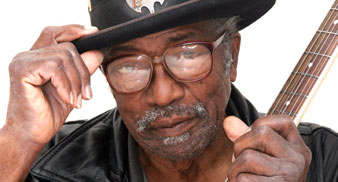Bo Diddley, who has died of heart failure aged 79, was a rock’n’roll pioneer and creator of arguably the first great electric guitar riff. Taking a lead from African tribal music, his distinctive 4/4 time signature was a trademark of most of his songs – a sound he once boastfully described as “the rhythm that shook the world”.
It was a typical remark from a man whose tongue-in-cheek self-aggrandisement became a running motif throughout his career. In addition to the self-titled 1955 single that introduced his famous riff, he also cut records with titles like “Diddley Daddy”, “Hey! Bo Diddley”, “Bo Diddley Is Loose”, “Bo’s A Lumberjack” and “The Story Of Bo Diddley”.
Yet, despite such playful self-promotion, he never became a mainstream star on the level of his early Chess Records labelmate Chuck Berry, or other contemporaries like Little Richard or Fats Domino. Even his calling card, “Bo Diddley”, was only a major hit when covered by Buddy Holly.
It took the next generation of musicians to catapult Diddley into the spotlight – the then-upcoming British R’n’B acts like The Rolling Stones, The Yardbirds and The Animals. He was namechecked by Bob Dylan in “From A Buick 6” on Highway 61 Revisited, and found further recognition in his homeland by touring with Creedence Clearwater Revival.
Born Elias Bates on December 30, 1928, in McComb, Mississippi, he moved to Chicago aged seven, adding the surname McDaniel after the aunt who raised him. He spent his childhood listening to blues and jazz radio stations, but when he launched his musical career, he named himself after a one-string African guitar: the diddley bow. Lack of money led to him building his own instruments, one of which, fashioned from an over-sized cigar box, became the template for a succession of rectangular-shaped guitars with which he remained associated for decades to come.
Always playing second fiddle to Chuck Berry at Chess Records, Diddley was an all-but-forgotten figure until the Stones revived his fortunes, personally inviting him to open for them on a 1964 UK tour. His influence on their early records is undeniable, especially the adoption of the famed Diddley riff on their cover of Buddy Holly’s “Not Fade Away”.
Subsequently, 1950s singles like “I’m A Man” and “You Can’t Judge A Book By Its Cover” found a new lease of life in the ’60s, with Diddley becoming a major draw on the live circuit, initially on US college campuses and latterly rock’n’roll revival shows. He went on to tour with The Clash in the 1980s, and even appeared in a TV commercial for Nike.
But belated recognition didn’t always reap financial rewards. As late as 1994, he was embroiled in a court case with an ex-manager whom he claimed owed him more than $400,000. “A lot of bands covered my stuff, but where’s the money?” he asked. “It didn’t come to me.”
The Stones remained active supporters; Keith Richards was on hand to induct him into the Rock’N’Roll Hall Of Fame in 1987, and Diddley also joined the group on stage at a televised show in Miami during their 1994 Voodoo Lounge tour.
“Bo was fascinatingly on the edge,” Richards once said. “His style was outrageous, suggesting that the kind of music we loved didn’t just come from Mississippi. It was coming from somewhere else.”
TERRY STAUNTON
PIC CREDIT: Phil Wallis


